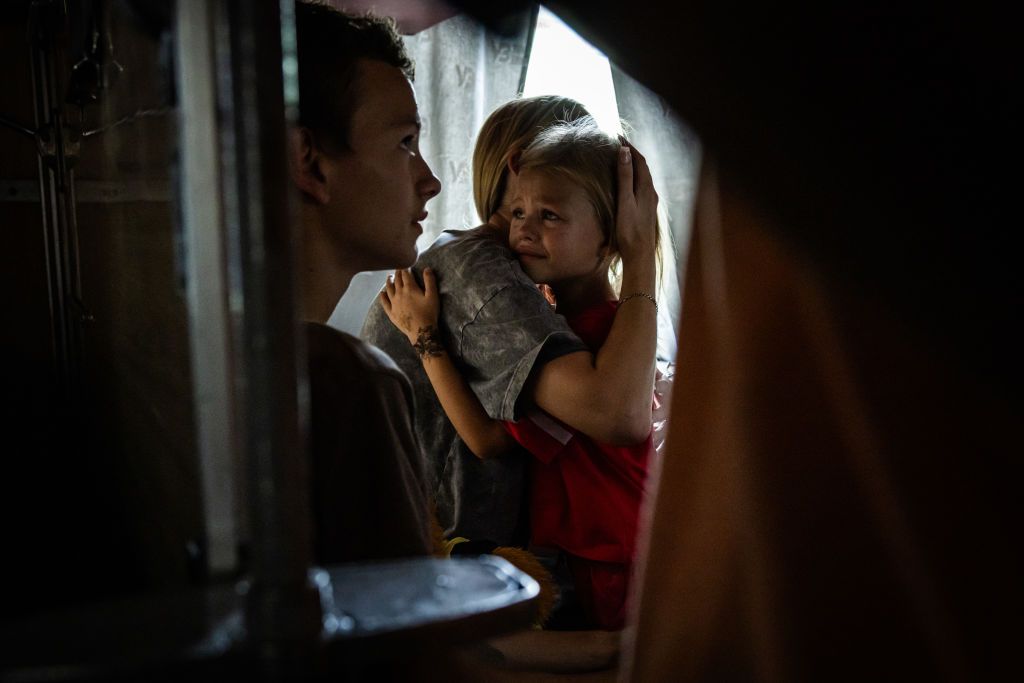A child weeps as it hugs its mother before the departure of an emergency train from Pokrovsk in Ukraine on Aug. 2, 2020, during Russia’s full scale war against Ukraine. (Ed Ram/For The Washington Post/Getty Images)
The following opinion piece is accompanied by the newly released documentary “Shadows Across the River” from the Kyiv Independent War Crimes Investigations Unit. Click here to watch the documentary.
“Let Russia maintain control over occupied Ukrainian territory to finally freeze this conflict!” This refrain is repeated in media and politics worldwide. It has become a popular “peace plan” for Russia’s War against Ukraine. One question is rarely addressed: What does this formula mean to Ukrainians who live under Russian occupation?
This question may be overlooked by some because they assume that life in these occupied areas has normalized and that people have adapted. This is the impression that Russian propaganda tries to create, while preventing independent observers, journalists and law enforcement officials from accessing these occupied territories. The truth is obscured under the Russian state media’s portrayal that everything is calm and in control.
Even Russian officials and media can give glimpses of truth. Dmitry Medvedev revealed the grim truth in an interview with the Russian Security Council‘s deputy chairman in February. When asked what should happen to Ukrainians who are waiting for the liberation of their land by the Ukrainian Army, he replied:
“These people must be punished and exposed if they are harming Russia.” We should send these people to Siberia to re-educate them.
These words do not only echo the repressions of the Soviet Era, but also openly admit the systematic terror Russia now imposes upon Ukrainian territories under its jurisdiction.
Even though this terror is pervasive and ongoing, it is difficult to document. Not only is access restricted, but fear also silences those who have managed to escape. Even those who have fled the occupation (a small number) are afraid to speak up for fear of their relatives and friends trapped under Russian rule. Many survivors say that they will tell all when the area has been liberated.
“This terror is ongoing, pervasive and yet it remains difficult for documenting – not just because access is restricted, but also because fear silences anyone who manages to escape.”
It doesn’t mean, however, that there is no information about Russian crimes. Journalists and law enforcement agencies occasionally receive reports of arrests and abductions. They may also hear about torture and murders. From time to time a new atrocity is revealed, with names, dates and brief descriptions of what happened. These fragments of information, however, are sporadic.
We’ve seen it before. In March 2022, the northern Ukraine was occupied and scattered reports of murders and other crimes began to trickle out from places such as Bucha and Irpin. The full extent of the systematic terror became shockingly apparent only after the Russian forces had retreated.
We can only see a few glimpses of these territories through the iron curtain that Russia has erected. Persistence pays off. The Kyiv Independent’s War Crimes Investigations Unit released a documentary entitled “Shadows Across the River” which details the terror in Hornostaivka – a town located on the Russian-controlled side of the Dnipro River, in Ukraine’s Kherson Oblast.
Our investigation revealed widespread abductions and torture in the town, as well as murders committed by the Russian military commandant’s office. We found a torture room in the former Ukrainian Police Station on Torhova Street where hundreds of people, some from towns miles away, were likely detained. We identified both the victims and perpetrators.
The atrocities in Hornostaivka did not end in 2022. The terror continued well into 2023, and probably still does. Anyone can be a victim: former Ukrainian soldiers or business owners whose property Russian forces want, or even someone greeting customers in a store with “Glory To Ukraine.”
Our documentary focuses primarily on Hornostaivka. However, similar horrors are occurring in other towns throughout Russian-controlled Kherson Oblast.
Uninformed readers might ask: If conditions are so terrifying why don’t people flee more? Many have tried to escape, but it is dangerous.
First, Russian forces closely monitor anyone trying to leave. Signs of pro-Ukrainian feeling, far from facilitating a departure, can often lead to detention and torture, as our film shows. Second, the elderly or the sick may not be able to travel, leaving behind their caregivers. Some choose to stay in order to protect their homes against Russian looters.
For many Ukrainians the occupation has become a snare. Their only hope is liberation.
Liberation is the only way to truth and justice. Only then will we be able to document the terror in its entirety and uncover the full extent of it, as we did when we liberated Bucha and Izium in 2022. Once the country is free, crime scenes, evidence, and survivors will be revealed. The land itself will also testify.
“Liberation also is the only way to truth and justice.” Only then will we be able to document and fully uncover the extent of terror.
In one of our previous documentaries, we examined the genocidal nature Russia’s war on Ukraine. Johns Hopkins University scholar Eugene Finkel made the following prediction:
“We know about Izium and Bucha because they were liberated. We also know about Irpin and Kherson. I’m convinced that mass graves will be found and evidence of mass killings when the Ukrainian Army reaches places such as Melitopol. We don’t yet have access to these places.”
This access will only come when Ukrainian territories are liberated from Russian control. Any “peace plan”, which leaves them under Russian control, will only entrench terror, hide it under propaganda, and make justice impossible.
It’s not an abstract matter; it’s about real people. By leaving them under Russian control, you are condemning them to countless tragedies and burying them in the name of “peace.”
Editor’s note: The opinions expressed by the authors in the op/ed section do not reflect the views of Kyiv Independent.
Read More @ kyivindependent.com













